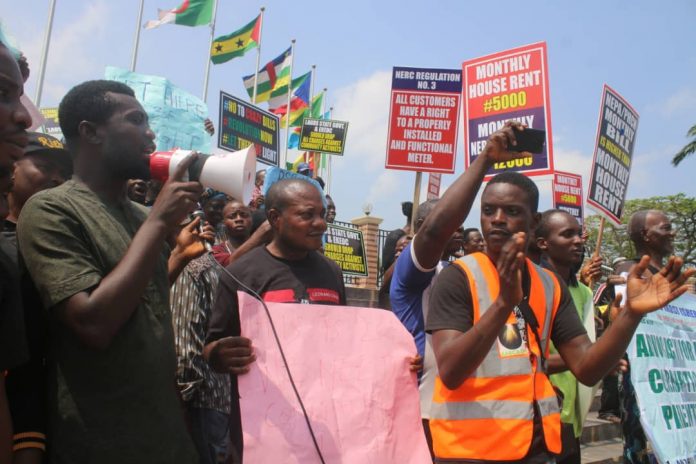On 17 June, community activists from several areas in Lagos state defied the carrot and stick measures of government and the electricity distribution companies when they demonstrated against electricity bills and epileptic power supply. Led by the Coalition for Revolution (CORE), comprising the Socialist Workers and Youth League (SWL), Take It Back (TIB) movement, Socialist Vanguard Tendency and residents associations, they marched from Ojota to the Lagos State House of Assembly, at Alausa, Ikeja where they submitted a petition to the leadership of the state parliament.
Further protests were also organised by workers and youths in some communities, as well as at the town hall meeting called by the Federal Competition and Consumer Protection Council, which was meant to douse the spirit of resistance, after the 17 June demonstration was announced.
There are several lessons to learn from this emerging generalisation of struggle for electricity rights, which would be invaluable as we move forward, towards building a national movement to ensure that poor working-class people access electricity as of right.
A day of defiance; protesting against all odds
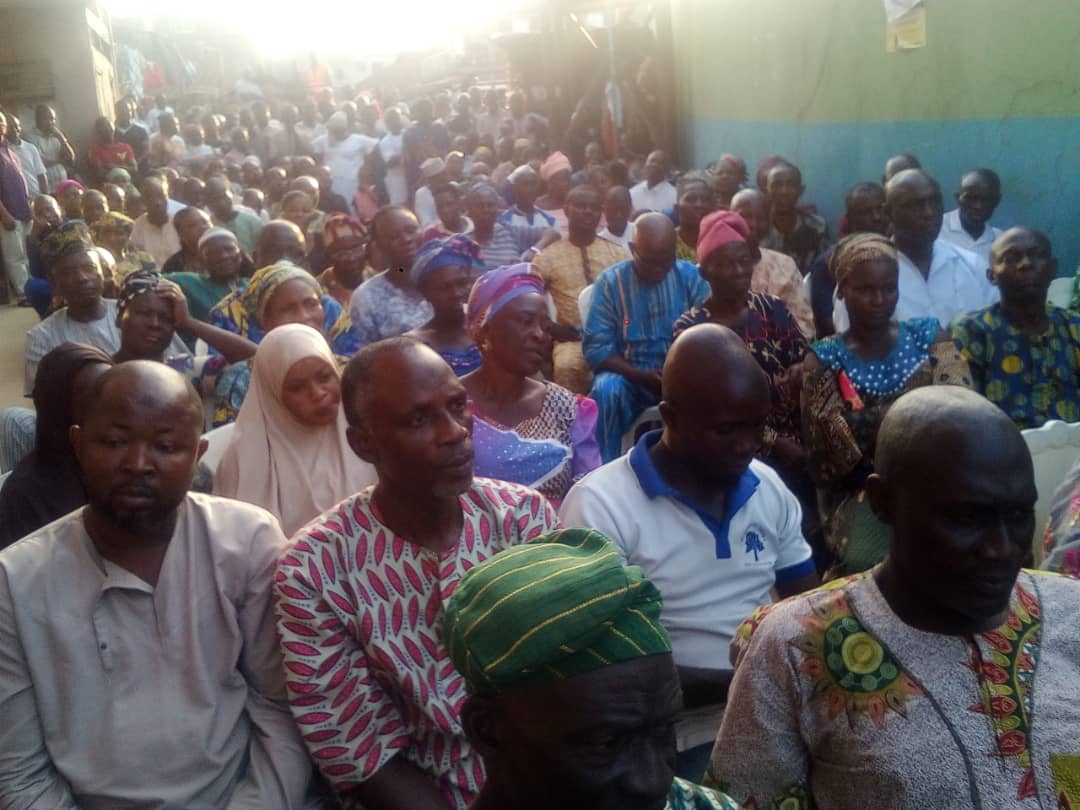
On Saturday 15 June, the decision to go ahead with the planned protest or postpone it was up in the air, as debates raged at a mass meeting held at the Orile-Iganmu community.
There were arguably reasonable reasons advanced for calling off the action by some leading community figures. The signs were clear that the state was all set to clamp down on us. Some community leaders were already in Kirikiri maximum security prison and the police had sent out warning that many more would end up there, if we carried out the protest.
We had also not been able to raise adequate resources needed to bus thousands of residents from the far reaches of Lagos state including Badagry, Agege, Epe and Ikorodu who would have otherwise joined the demonstration.
The decision to act despite all odds was not one taken lightly. Nor was it out of disrespect for the community leaders who felt discretion was the better part of valour. On the contrary, we hold them in high esteem, they have paid their dues in this struggle and continue to do so.
But, a key lesson for resistance is that “if we fight, we might lose, but if we don’t fight, we’ve already lost”. And more importantly, the mass anger and readiness of the rank-and-file residents in every community involved was clear.
In Mushin, which had been at the eye of the storm of a shameless state’s repression, the community-based association as a whole expressed its readiness for the mass action. Activists from several parts of the country including Abuja, Port Harcourt, Abeokuta, Keffi, and Benin also called in and expressed their desire to take action on 17 June, likewise.
Whilst it might have been foolhardy to encourage a national action at such short notice without adequate preparation (since the protest was planned to consolidate on the movement in Lagos for now), we would have lost the initiative and contributed to dampening the morale of rank and file working-class people in the communities who have been at the barricades, if the protest action fixed for Ojota/Alausa was deferred.
Before the protest march a series of mass meetings had been held with residents from Mushin, Ijora, Oshodi, and a number of other communities in Lagos state. At one of these meetings, held on 1 June at Ijora-Badiya with over a thousand residents in attendance, it was resolved to hold a demonstration against the failure of the privatisation of the power sector, and extortion of residents in working-class quarters by the GENCOs and DISCOs.
The demonstration was to bring together residents from communities across the state as a first step towards building a nationally coordinated fightback to win the human right to access electricity, across the length and breadth of Nigeria.
It builds on earlier waves of struggle against epileptic power supply and crazy bills that have been waged separately by working-class people in different parts of the country over the last five years and aims to unite our resistance. When residents from Mushin protested at the Eko Electricity Distribution Company (EKEDC) on 16 April, their struggle inspired residents of Ijora-Badiya to call for a broad meeting of working-class communities in Lagos state on 20 April, which would carry forward this aim at the state level.
Socialist Workers and Youth League (SWL) and Take It Back (TIB) movement which are both part of the Coalition for Revolution (CORE) participated actively in the April demonstration and subsequent meeting. Our perspective for generalising the fightback and centralising coordination resonated with the communities’ residents.
Significance of the demands of the movement
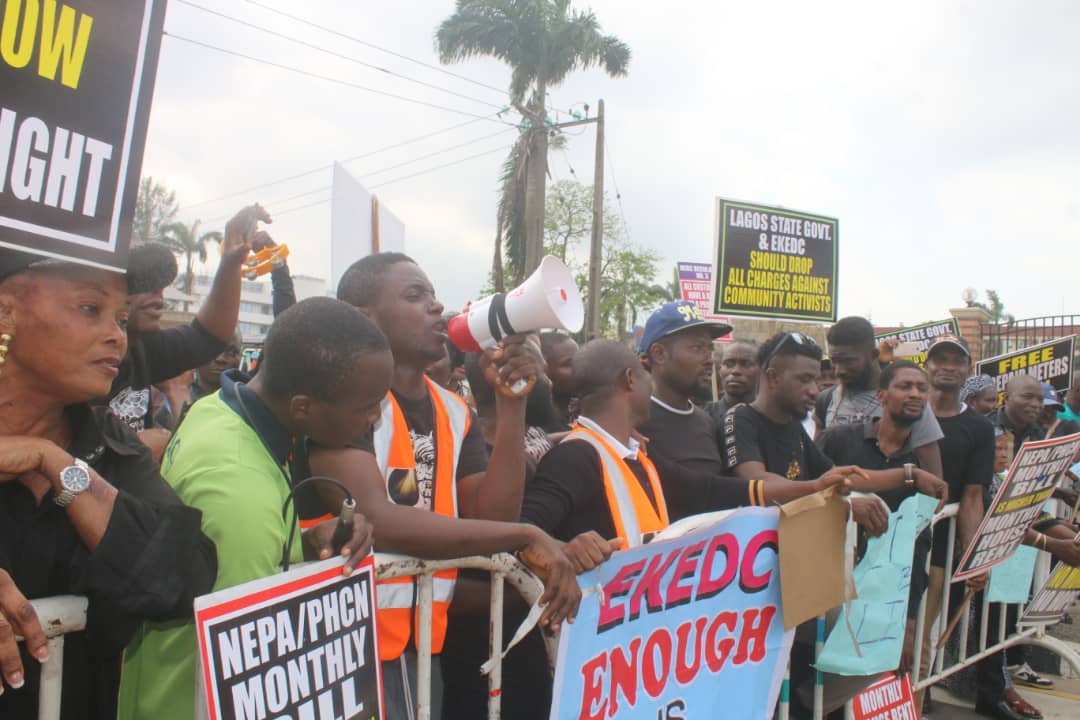
The demands of CORE and the Landlords and Tenants Association of Nigeria, LTAN[1] presented to the Lagos State House of Assembly are quite far-reaching and interconnected.
These include: end to estimated billing; immediate provision of prepaid meters to residents, without meter charges; end to victimisation of community activists and groups; dropping of all the trumped-up charges against community activists resisting anti-poor electricity policies and practices; renationalisation of the power sector and all other commanding heights of the economy, to be put under workers’ democratic control and management.
It is important to note that the anti-poor billing and epileptic power supply are manifestations of a deeper problem. The fundamental issue is that the economy and society as a whole are run by rich people to benefit themselves, at the expense of we, the poor working masses.
A major claim of government for privatising the sector was that NEPA was inefficiently run as a public corporation. But, the situation six years after privatisation is no better, in fact things have moved from terribly bad to horrendously worse. Even the richest of the bosses, Mr Aliko Dangote drew attention to this, as he pointed out that it took Egypt just eighteen months to increase its electricity by 10,000 megawatts.
Meanwhile, even under private entrepreneurs and despite the federal government’s N1.02 trillion bailout to these bosses who now own generation and distribution of power, the average generation is just 4,000 megawatts.
There is thus absolutely no basis to say private provision of electricity is better, except for the pockets of those bosses who own the distribution companies (DISCOs) and generating companies (GENCOs), which include several former heads of state and other political figures who enriched themselves in the first place by stealing from the national purse when they were in government.
Estimated billing is one of the ways they skim us dry without even delivering the much-needed electricity. Electricity tariffs are already sky-high, even with prepaid meters. But with estimated billing, prices are further bloated, since the estimated bills do not take into cognisance the long hours and days when electricity is not supplied. This is why we are strongly against estimated billing.
It is a shame that in a country which now has over 200 million inhabitants, only 1.67 million “customers” have prepaid meters. The cost of a prepaid meter ranges from N36,991.50 for a single phase to N67,055.85 for three phase meters. Meanwhile, the subsisting minimum wage is just N18,000 and the new minimum wage which is yet to be implemented is N30,000.
Therefore, it is virtually impossible for a poor working-class family, which would still have to pay house rents and transport fares, to afford one and avoid starving for some months. As if that were not bad enough, they would further be expected to pay an electricity meter charge.
This is why we demand the provision of prepaid meters without any charge whatsoever. The meters are properties of the DISCOs. Their costs should not be shifted on poor working people who can ill afford paying such.
The heavy hand of repression and poisoned carrot of town hall meetings
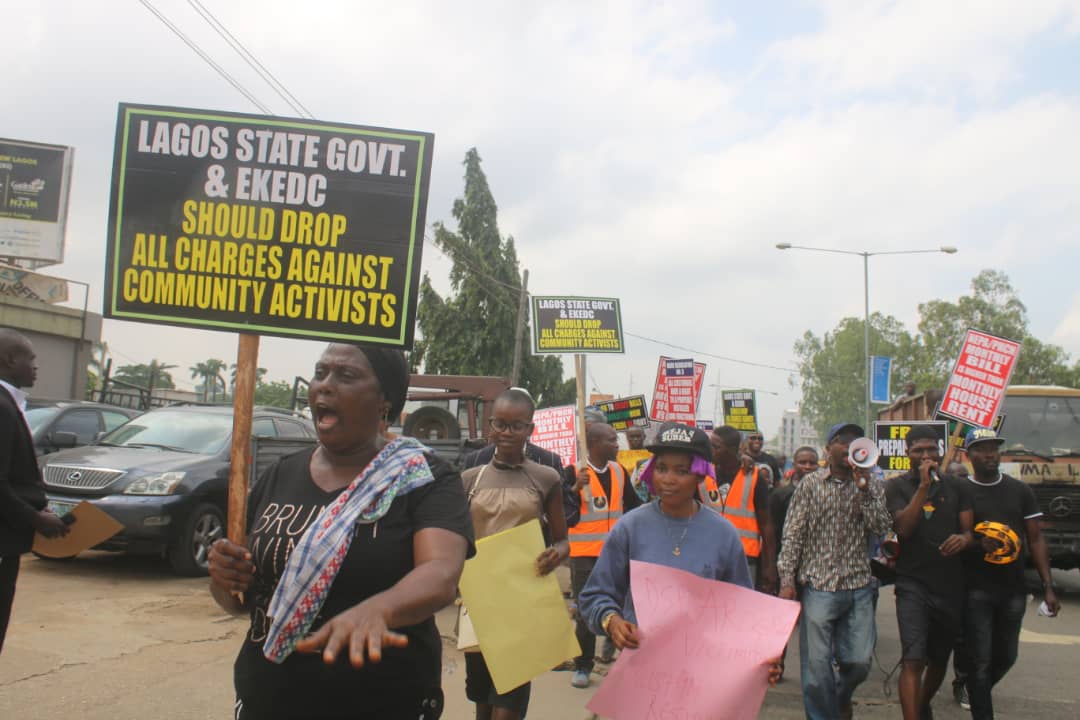
Repression by the state commenced from the very beginning of the Mushin residents’ protest in April. Several community activists and leaders have been arrested over the last two months. The vindictiveness of the bosses’ can be seen in the fact that most of these persons were not even arrested during protests. Rather, in most cases, the police brutally swooped on the communities after demonstrations to make targeted arrests of activists.
Some of those who have been arrested since 16 April and were subsequently released after campaigns for them to be freed, including by SWL are: Moses Ogunleye, Osinowo Adesanya and Agharigidoma Salman, all of whom were community leaders in the Mushin area.
More recently, Samuel Olarewaju, Chair of the Ijora-Badiya Landlords and Tenants Association was also arrested on 18 June. He went to the Divisional Police station in the area to welcome the new Divisional Police Officer (DPO), as a community leader, only to be detained after being informed that the police state command had issued a warrant for his arrest following a petition of the EKEDC. The police denied him bail, insisting the order for his arrest cam from their “oga at the top”. And he was charged to court on Friday 21 June, from where he was remanded in custody.
This is a recurring pattern which the mainstream media has shied away from reporting, despite press statements issued by the community associations and organisations such as the SWL and the CORE coalition. This goes a long way to show that we can rely only on ourselves as working-class people. We must build the forces of this movement into a tsunami that will sweep down their censorship of our struggle and repression of the state.
It is already clear to government and the class of rich people it represents that the momentum of our struggle is rising and cannot be held back with repressive measures and press blackout. They have now included the carrot of incorporation into their tactics, without withdrawing their heavy hand of repression.
That is why the Federal Competition and Consumer Protection Council organised a series of town hall meetings in Lagos, between 18 and 20 June. They thought this would take the winds from the sails of our 17 June demonstration. But their plans backfired.
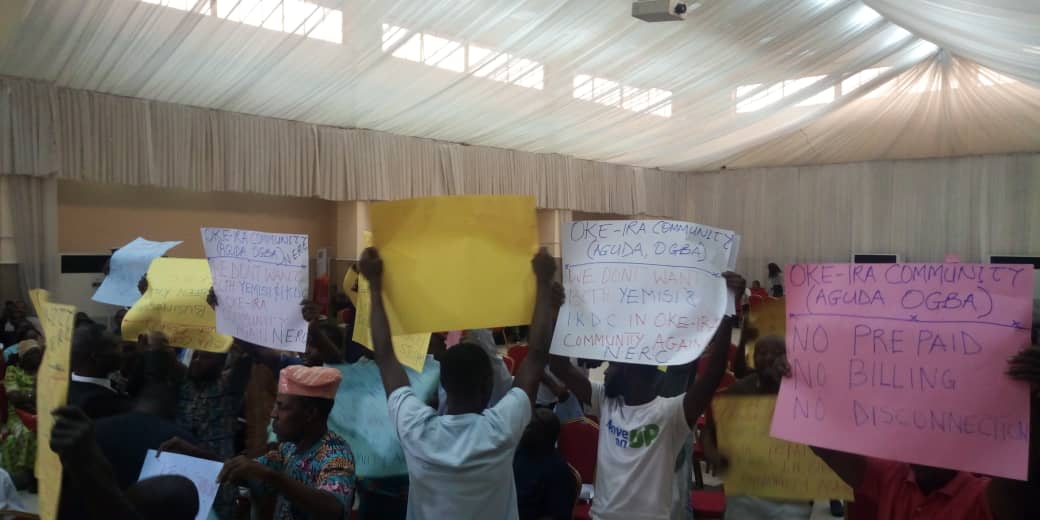
There was protest even inside the town hall meeting on 18 June. Residents from several communities that had been invited, including those of the Oke-Ira/Aguda-Ogba area stormed the place with placards, demanding an end to rabid disconnection, crazy billing and the metering regime.
This sends home a clear message, we will not be deterred, not by repression and not by political “bribery” of their sweet talk. Our ranks will not be broken – we march forward, until victory!
A luta continua! The struggle continues!
It is now clear that the Next Level government of APC intends to flog us with scorpions where it (and the earlier PDP government) flogged us with whips. “The Nigerian Electricity Regulatory Commission (NERC) has indicated it will grant new electricity rates to electricity distribution companies (Discos)”. This will be based on Performance Improvement Plans (PIP) by DISCOs for the 2020-2024, under the Multi-Year Tariff Order (MYTO).
While the idea they are selling is about services improvement, what it will amount to for working-class people is higher bills to pay, for us to access electricity. We must seize the time now and make it impossible for them to increase electricity tariffs by next year.
The embers of resistance being stoked now must be fanned into fires of workers’ power on the streets of our communities and in our workplaces. The boldness of the 17 June demonstration is an ignition, inspiring this new phase of struggle to spread.
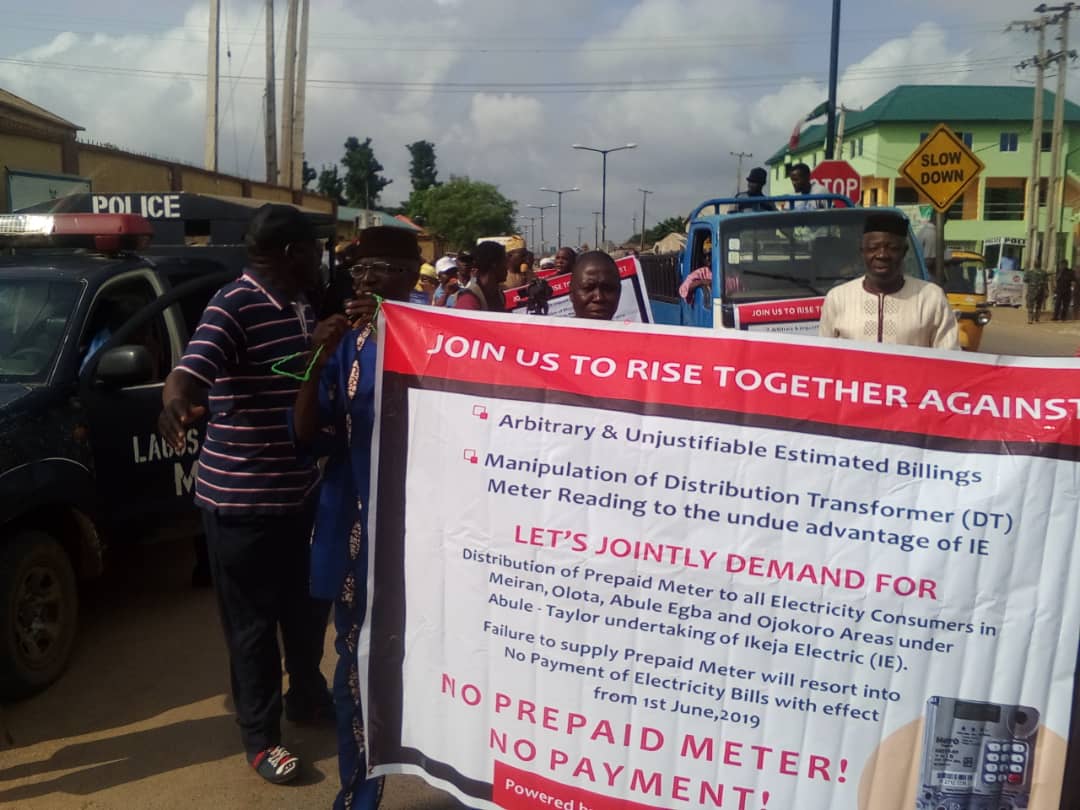
The following day, residents from communities across Meiran, Olota, Abule-Egba and Ojokoro areas also organised a protest march. They equally condemned “arbitrary and unjustified estimated billings”, and declared “No Prepaid Meters, No Payment”.
In Nyanya, Abuja, members of SWL organised community meetings which brought residents together to strategize towards mass actions. Similar meetings were also held at Port Harcourt and have been slated for a number of cities across the six geo-political zones.
CORE organised a meeting on 21 June towards “Building the Coalition to Address Poor Service, Exploitation and Excesses of Electricity Companies”. The meeting deliberated on strategies “to unite communities and organizations’ response against the current exploitation and excesses of the privatized electricity companies were discussed” around three key demands, thus: 1) an immediate end to estimated billing; 2) Free Metering; 3) Public Review of the entire privatization program and revocation of the licenses of the current operators.
It was resolved that a No Payment Strike, should be organised, nationally. The added news of impending tariff hike by next year makes such a strike, quite imperative. This must be backed with pickets and mass protests. Trade unions at national, state and local levels could bring the immense might of organised labour to bear, marching with working-class people as residents of communities, who are already at the barricades.
Now more than ever, all communities, trade unions, and civil society organisations in different parts of the country, committed to fighting against anti-poor policies, must stand in solidarity to wage relentless struggle with national coordination. This unfolding phase of mass struggle requires audacity as the 17 June demonstration shows.
Access to electricity is a human right. It is not only the rich who deserve improved service delivery. And we cannot pay higher tariffs, even the current tariffs are unbearable for poor people. Working-class communities’ residents in Maiduguri protested against 24-hour electricity supply not because they do not want it, but because they could not afford the cost.
To make affordable and constant electricity available for all, we must take back the power sector from the private profiteers, and place this under the democratic control of working-class people. With struggle we shall win, because freedom comes only by struggle.
Workers and youth in our communities, factories, offices, and on the streets, unite and fight NOW!
by Baba AYE
[1] LTAN unites residents together on common issues like electricity, water and sanitation. The “landlords” are not absentee big property owners.


